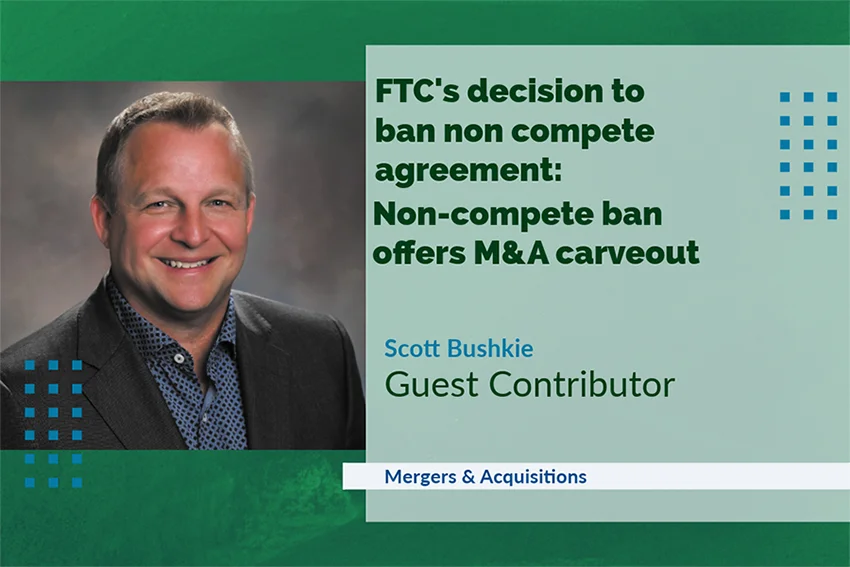
May 14, 2024
The Federal Trade Commission (FTC) rule banning non-compete agreements bars nearly all post-employment non-compete agreements, making it harder for employers to protect trade secrets, customer relationships and their investment in specialized training.
The good news is that the rule provides a limited carveout for non-competes entered into as part of the sale of a business.
In mergers and acquisitions (M&A) a non-compete agreement is often used to prevent the seller from opening a similar business (or even working in one) within a certain geographic area, for a specified amount of time.
Under the new FTC rule, a buyer may still impose a non-compete on the seller pursuant to a “bona fide sale of a business entity, of the person’s ownership interest in a business entity, or of all or substantially all of a business entity’s operating assets.”
Note that state laws still apply where they are more restrictive.
Minority owners
Importantly, the FTC removed a requirement from its proposed rule that would have limited this exception to sellers holding at least a 25% ownership stake.
What that means is even minor minority owners could be locked up with a non-compete.
So in theory, a non-compete could be valid even if the seller holds just a 1% or 5% equity stake.
This gives buyers a potential avenue to restrict at least some key employees who have a small ownership interest, like C-suite executives with equity compensation.
What’s unclear is whether buyers involved in transactions with broad employee ownership, such as at companies with an employee stock ownership plan (ESOP), could also use the exception to secure non-competes from a wider swath of the workforce.
No transaction limit
As part of the rulemaking process, the FTC declined to impose a dollar limit on the use of non-competes in an M&A transaction.
In other words, non-competes may still be used even in small Main Street transactions – say the sale of a hair salon or restaurant, for example.
However, the FTC notes that such non-competes generally need to show that they are necessary to protect the value of the business, to comply with relevant state laws.
As such, these non-competes will need to fairly balance the buyer’s need to protect their investment with the seller’s right to future employment opportunities.
Retaining key employees
Meanwhile, because the rule bars any new employee non-compete agreements, it still eliminates a key tool acquirers have used to protect the value of their investment post-closing.
In the past, it was common practice for a buyer to require all employees to sign non-competes as a condition of employment with the new entity.
This helped the buyer deter key personnel from leaving, thereby protecting the goodwill and value of the acquired business.
With this tool no longer available, buyers will need to explore alternative arrangements to retain and incentivize key non-owner employees.
Potential strategies could include retention bonuses, phantom equity plans, stock options and minority ownership stakes.
These so-called “golden handcuffs” financially motivate key employees to stay on for some period post-closing.
Arguably, sellers could look to grant minor equity stakes to key employees before putting the business up for sale, with the goal of subjecting those employees to a non-compete when the deal closes.
This approach could theoretically enhance the value of the business in a buyer’s eyes by providing a mechanism to tie up important personnel post-closing.
Non-solicitation
The FTC rule does still allow confidentiality/non-disclosure agreements and non-solicitation agreements (barring the solicitation of customers or other employees), within limits – so those will remain important tools for buyers to mitigate risk.
But the overall M&A playbook will need to adapt to account for the FTC’s broad non-compete ban.
Exploring alternative employee retention strategies and pricing their cost into the deal may be essential considerations in a post-noncompete world.
It’s worth noting that the U.S. Chamber of Commerce has sued the FTC to block the rule, and at least one other legal challenge is pending.
Barring a stay, the non-compete rule is slated to take effect in September.
 HSHS to invest $270 million in St. Mary’s, St. Vincent
HSHS to invest $270 million in St. Mary’s, St. Vincent A human-centered approach to high-end design
A human-centered approach to high-end design








